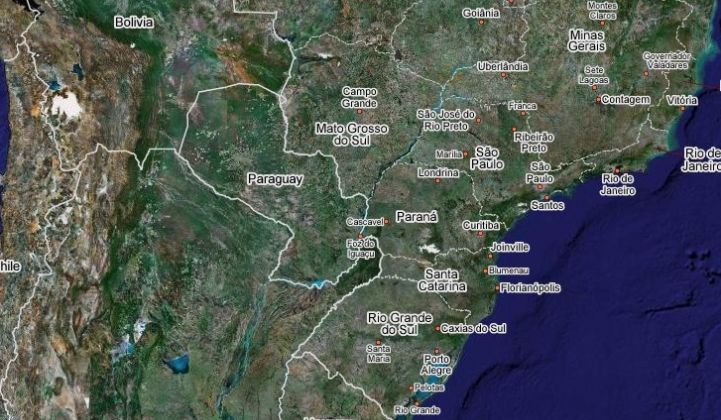We’ve seen a flurry of smart grid news from Brazil this year, with companies Elster, Landis+Gyr, Echelon, Aclara, General Electric, Trilliant and Siemens/eMeter staking their claims to the country’s potential 60-million smart meter market. Monday brings more news on the Brazilian smart grid battlefront, this time from Silver Spring Networks and Sensus.
Let's take IPO candidate Silver Spring first. On Monday it announced a partnership with CPFL Energia, the country's biggest non-government utility, for a "foundational smart grid networking project" covering a massive territory that includes the urban jungle of Sao Paolo, as well as the actual jungle of the states of Rio Grande do Sul, Paraná and Minas Gerais. The two will start by linking commercial and industrial customers, but intend over time to deliver smart grid coverage for low-voltage (i.e., residential) clients, as well as new distribution grid automation projects, according to Monday's announcement.
Silver Spring has some big customers, including Pacific Gas & Electric, FPL, Pepco, Commonwealth Edison and Progress Energy. But it's hard to imagine a rollout bigger than its long-range plans with CPFL -- or one fraught with more challenges. Besides environmental issues and the sheer scale of southern Brazil's grid, there's power theft on a scale unheard of in the United States: up to 25 percent or higher in some regions. Of course, Silver Spring has been doing a 1,000-home pilot project with Sao Paolo utility AES Electropaulo since last year, so it presumably has been working on solving problems like these.
By any measure, it's a big win for Silver Spring in terms of potential scale, as well as being its first major project outside the United States, besides Australia. The Redwood City, Calif.-based company filed its S-1 last summer but has yet to pull the trigger on its IPO, though it has raised money from EMC and Hitachi since then. With North American smart meter deployments on a long-term decline and Europe subject to significant financial uncertainty, the smart grid industry has been turning to developing economies like Brazil, China, India and South Africa for the next wave of smart meters.
Monday's project also sounds like it may involve eMeter, the meter data management software company bought by Siemens last year. CPFL Energia announced eMeter as a partner earlier this month in a C&I smart metering project that sounds a lot like the one Silver Spring described in Monday announcement.
Siemens also bought Brazilian meter software vendor Senergy Sistemas de Medição S.A in June. Brazil's government demands that most of the manufacturing of smart grid projects be done domestically, which has led to meter vendors like Landis+Gyr, Elster, Echelon and Itron building factories in Brazil or partnering with domestic manufacturers to bring their technology to a government-mandated rollout that's expected to reach 60 million meters by early next decade. Trilliant is piloting in Brazil with AES Electropaulo, using GE’s smart meters built in-country, and Echelon is partnering with ELO Sistemas Electronicos to embed the San Jose, Calif.-based company’s smart grid technology in ELO’s domestically manufactured gear.
Sensus Wants to Take Brazilian Technology Global
On Monday, Raleigh, N.C.-based smart meter vendor Sensus announced it was staking a claim in Brazil's market as well, with a 15-percent equity position in Brazil’s CAS Technologia, one of the country’s bigger smart meter companies. The investment comes along with partnership opportunities that could help Sensus break into Brazilian markets -- as well as a new product to sell around the world.
That’s CAS Technologia’s Hemera utility data management platform, described in Monday’s release as “a simple and continuous data network monitoring and analysis tool” now used by sixteen power and water utility customers in Brazil and globally. “Given that CAS is the region’s leader for smart grid, AMI and distribution automation technology and that our products are highly complementary, we see tremendous opportunities for both Sensus and CAS in the Americas and worldwide,” is how José António Hernandez, Sensus' executive vice president, put it in Monday’s release.
CAS, founded in 2000, is headquartered in São Paulo and serves customers in the financial, government, telecommunications and utilities markets. The company claims specialties in telemetry, smart grid, software development, data collection, backup and recovery, virtualization, business continuity and submetering.
As for Sensus, it’s one of the top contenders in U.S. smart meter deployments to date, with customer stretching from multi-state utilities like Southern Co. to a host of rural cooperatives. It had some 19 million meters deployed as of the first quarter of this year, according to the GTM Scott AMI Market report.
The privately held company was rumored to be for sale last year, but has declined to comment on that speculation. Toshiba bought rival Landis+Gyr for $2.3 billion last year and European smart meter giant Elster was taken private in a $2.3 billion transaction with private equity firm Melrose last month, adding fuel to the fires of speculation of another big meter company being acquired.
Sensus has also been spending money on strategic investments to bring new technologies into play using its licensed-spectrum, point-to-multipoint FlexNet technology. Beyond electricity, water and gas meters, it’s also working on smart streetlights with Chattanooga’s EPB. Earlier this year it invested £5 million ($7.9 million) in U.K. startup Navetas and licensed its load-disaggregation technology for use in the United States.



